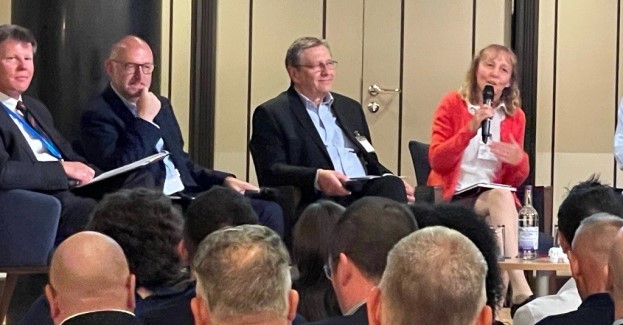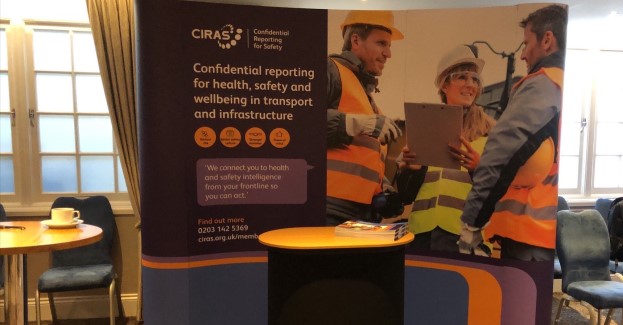Catherine Baker, director of CIRAS, joined the panel at Port Skills & Safety’s member conference alongside safety leaders from other sectors speaking to the ports and maritime industries.
CIRAS’ Catherine Baker focused on shared learning and cross-sector working for safety improvement during her introductory remarks at Port Skills & Safety’s members’ event on 5 July.
Catherine sat on a panel of four safety leaders from sectors outside the ports and maritime industries, all offering new perspectives. The other speakers were Ian Russon of Tata Steel, Phil Scott of the Chemical Industries Association, and Rail Safety and Standards Board’s Johnny Schute.

Above: Catherine Baker (left) on the panel at the Port Skills & Safety conference
The panel discussions were aimed at providing insights that could bring a ‘step-change in safety’ in the ports industry, and provoking thoughts on questions about topics such as under-reporting and having an open safety culture.
After setting the scene about our membership across bus, tram, transport infrastructure and rail in the UK and the Republic of Ireland (including Rosslare Europort) – and stating CIRAS’ origins in safety learnings from rail accidents – Catherine focused on topics where other sectors may be able to learn from ports, and ports may be able to learn from other sectors.
She highlighted similar challenges across CIRAS’ current membership base and beyond, from fatigue in 24/7 operational environments with shift work, distraction from safety-critical tasks due to temperature or poor ergonomics of vehicle cabs (bus, train, crane), as well as time pressures and a desire to get the job done leading to shortcuts and procedures not being followed.
CIRAS operates as a community for cross-sector shared learning, with all reports and responses shared so that others can identify similar issues and access ideas on how others have addressed them. Newsletters and events create space for members to share further learnings to the community. Recent examples include a member’s initiative to encourage the workforce to challenge unsafe behaviour – which has been picked up by another member – and work on fair culture relating to fatigue.
Fear and futility
‘People are people – whatever sector they work in,’ explained Catherine. ‘There are a range of reasons why speaking up can be hard, and however open your culture, and however much you work at having open doors, people bring with them the baggage of prior experiences.
‘Fear and futility are the main reasons people give for contacting us confidentially. Fear that if they speak up openly they will be treated differently, and futility that even if they speak up nobody is listening.’
Non-inclusive behaviour
Listening can be even harder than speaking up, she added, from simply not having the time through to biases getting in the way of real listening.
Non-inclusive behaviours are a ‘double hit on safety’, Catherine said, because these behaviours can directly impact safety and make it less likely people will speak up. ‘If you are working in a toxic culture, it can be a real distraction from being able to do your job safely. If you are in a minority you may find that the tools, equipment and facilities are not suitable for you, but you don’t want to make a fuss as this emphasises the differences. From toilets to PPE to harassment – this is a topic we are starting to hear about more from those who call.’
Third-party reporting
Those who do contact CIRAS may have nowhere else to go about the safety issues they are raising, she added, with over 20% of the concerns raised through CIRAS being for an organisation other than the reporter’s employer. ‘Many parts of the transport sector see different organisations working side by side, and for staff it can be hard to navigate who to speak to about an issue, so a single independent place for reporting can be of real value.
'Where there are commercial relationships between the organisations working side by side, a further challenge to speaking up is a fear of jeopardising the next contract. We know this because we always ask people why they have chosen to speak up confidentially. Fear works at different levels, and protecting identities is one way we help safety voices overcome it.'
The power of listening
In a closing statement, Catherine encouraged all those present to make space to listen, really listen to their people. Those working at the sharp end of any operation know what really happens every day, and if you give them the time, space and channels to be heard they have the insights to improve safety.
Find out more
Speaking up for workforce safety in port operations
Be confident about workplace safety with confidential reporting

Tags
- Confidential reporting
- Ports
